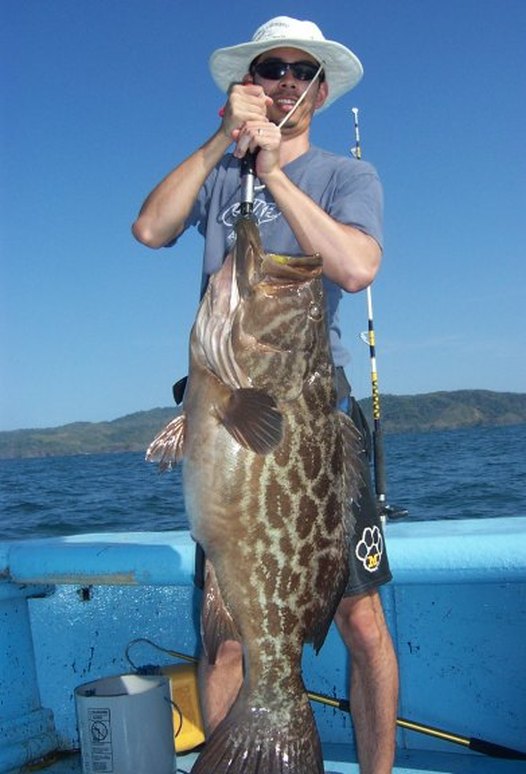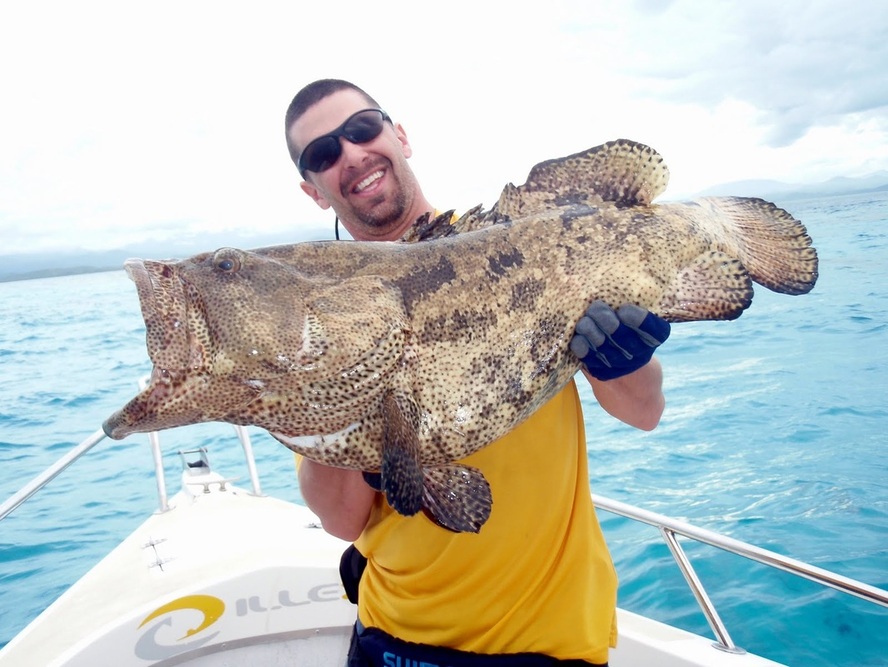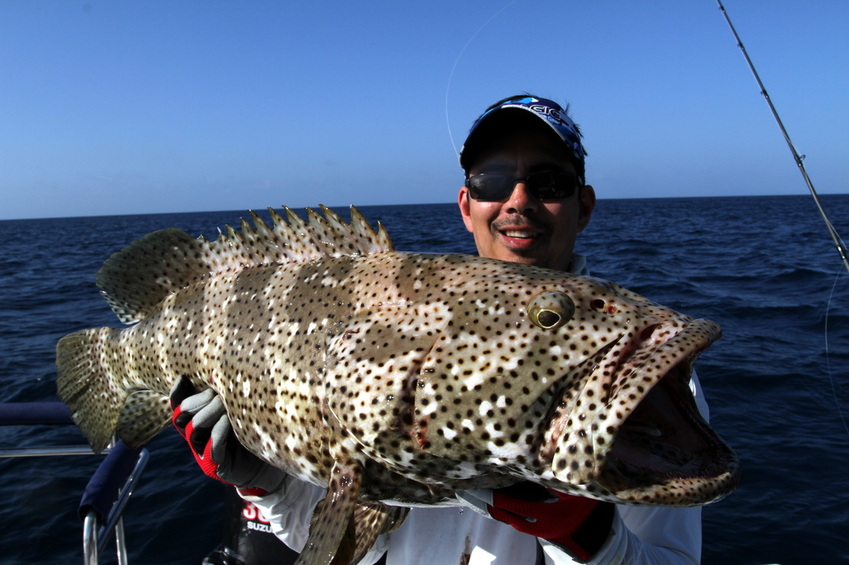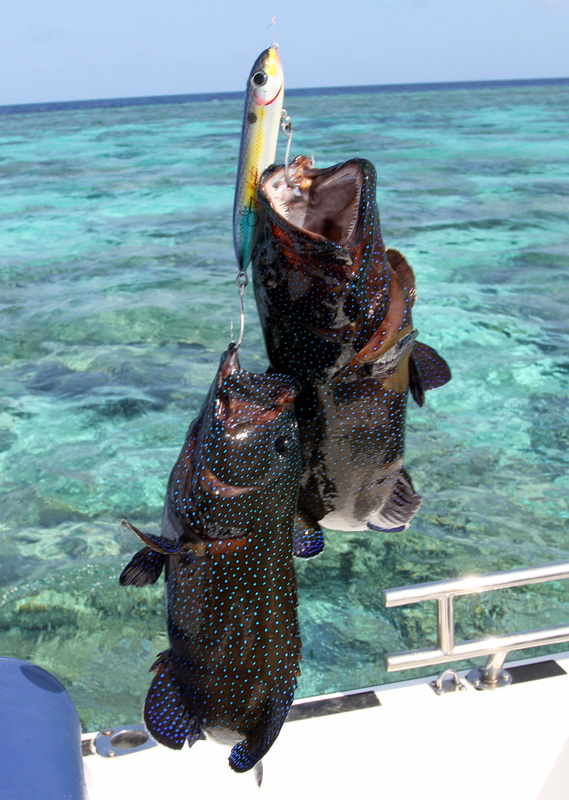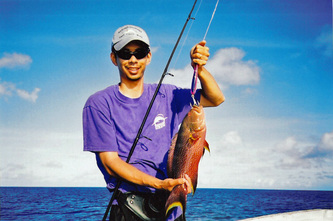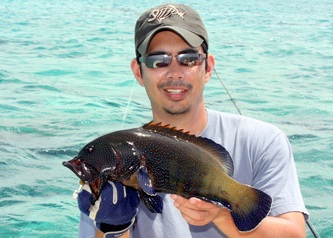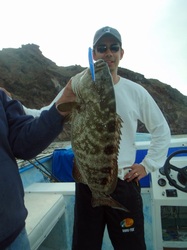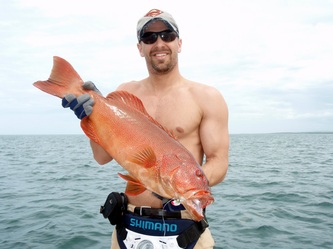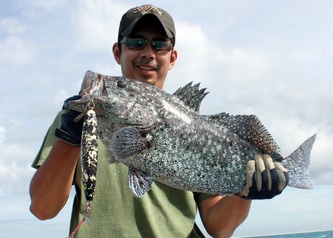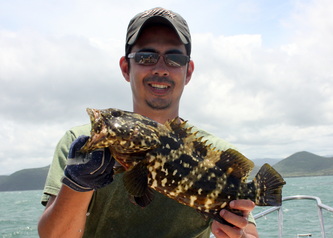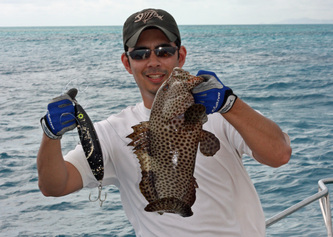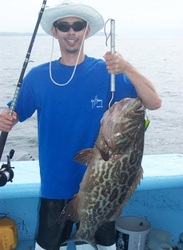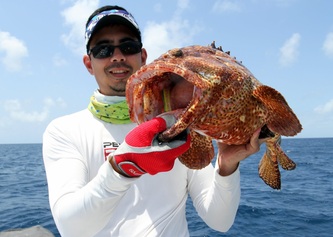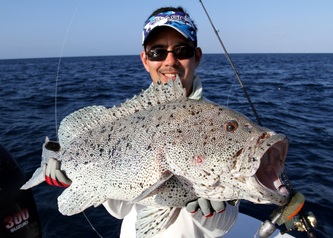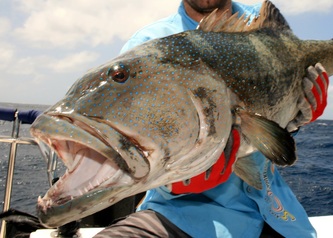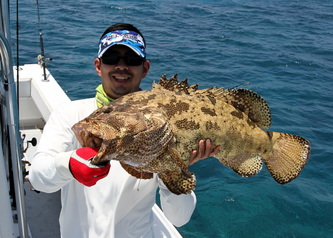Groupers
Home
Other Species
Epinephelus and Mycteroperca
Grouper Description
Grouper are one of my favorite types of fish. They are generally very good to eat and are sporty to catch. They generally live in reefs and, when hooked, will make a powerful run to their favorite hole and break you off on the rocks if they can. They don’t have a lot of stamina, but that initial surge can permanently embed the butt of the rod deep in your gut if you aren’t paying attention. For this reason, even relatively small Grouper often require fairly heavy tackle because of the amount of drag necessary to keep them from their reef.
Grouper have large mouths relative to their body size and can engulf large baits. They often come up and eat other reef fish that have been hooked as they are being reeled in. If you are using scaled-down tackle for the smaller reef fish you are going to need a lot of luck to avoid making a tackle donation to the local reef foundation. There are many species of Grouper found all around the world and you could easily write a whole book about them. I will just stick to some general tips based on the types of Grouper fishing I have done. One of the best things about Grouper is the many colors and variations there are. I have tried to include a good sample of pics of different ones below. You could spend your whole fishing life chasing all the different kinds of Grouper around the world and it would not be a life wasted.
Grouper Tackle
Tackle is going to vary depending the size of Grouper targeted. In general you are going to need heavier tackle than you would normally need for equivalent sized fish. If you are targeting Grouper larger than 50lbs or so and there are a lot of rocks in the area there is almost no tackle that is too heavy. Braided line is a big advantage because of its no-stretch qualities. A reel with a quality drag that has a lot of stopping power is a must. If you are fishing in a shallow reef area you may not be able to give the fish any line at all. If you are fishing with monofilament line even if you don’t give any line the line stretch may be enough to allow the Grouper to get into the rocks. For the biggest Grouper I would go with an Accurate 2-speed reel with a heavy duty, short Calstar rod with all roller guides. Plenty of other quality reels will work though.
I managed to land a 175lb Goliath Grouper on spinning tackle once (this required a lot of luck) but in general you should go with conventional tackle for the big guys.
If you were thinking about purchasing any fishing tackle and found any useful information on this site, please consider purchasing through the links below. I have added links for some good Grouper tackle for both large and small fish for a variety of budget ranges:
Home
Other Species
Epinephelus and Mycteroperca
Grouper Description
Grouper are one of my favorite types of fish. They are generally very good to eat and are sporty to catch. They generally live in reefs and, when hooked, will make a powerful run to their favorite hole and break you off on the rocks if they can. They don’t have a lot of stamina, but that initial surge can permanently embed the butt of the rod deep in your gut if you aren’t paying attention. For this reason, even relatively small Grouper often require fairly heavy tackle because of the amount of drag necessary to keep them from their reef.
Grouper have large mouths relative to their body size and can engulf large baits. They often come up and eat other reef fish that have been hooked as they are being reeled in. If you are using scaled-down tackle for the smaller reef fish you are going to need a lot of luck to avoid making a tackle donation to the local reef foundation. There are many species of Grouper found all around the world and you could easily write a whole book about them. I will just stick to some general tips based on the types of Grouper fishing I have done. One of the best things about Grouper is the many colors and variations there are. I have tried to include a good sample of pics of different ones below. You could spend your whole fishing life chasing all the different kinds of Grouper around the world and it would not be a life wasted.
Grouper Tackle
Tackle is going to vary depending the size of Grouper targeted. In general you are going to need heavier tackle than you would normally need for equivalent sized fish. If you are targeting Grouper larger than 50lbs or so and there are a lot of rocks in the area there is almost no tackle that is too heavy. Braided line is a big advantage because of its no-stretch qualities. A reel with a quality drag that has a lot of stopping power is a must. If you are fishing in a shallow reef area you may not be able to give the fish any line at all. If you are fishing with monofilament line even if you don’t give any line the line stretch may be enough to allow the Grouper to get into the rocks. For the biggest Grouper I would go with an Accurate 2-speed reel with a heavy duty, short Calstar rod with all roller guides. Plenty of other quality reels will work though.
I managed to land a 175lb Goliath Grouper on spinning tackle once (this required a lot of luck) but in general you should go with conventional tackle for the big guys.
If you were thinking about purchasing any fishing tackle and found any useful information on this site, please consider purchasing through the links below. I have added links for some good Grouper tackle for both large and small fish for a variety of budget ranges:
Grouper Techniques
Grouper can be caught on lures, live bait, and dead bait. My favorite way to catch them if they are shallow is casting jerkbaits in shallow reef areas but a large livebait sent down to the bottom and then lifted a crank or two is probably the most effective way to catch them day in and day out.
Grouper Lures
Many people have success trolling deep diving plugs so that they go just above the reef where the fish are. If you are fishing a shallower reef it can be great fun to cast jerkbaits like a Yo-Zuri Crystal Minnow and retrieving them erratically with frequent pauses. Many times the fish bite on the pause.
In deeper water they can be caught on metal jigs. You just bounce them off the bottom and occasionally take some cranks and then drop them back down. My biggest lure-caught Grouper was caught on a Salas 7X jig. Diamond jigs, although they don't look fancy, work in a lot of places. They often hit bucktail jigs, either tipped with bait or plain.
You can also troll deep diving plugs such as the Mirrolure in Pink or Orange, colors that work surprisingly well.
Click below to purchase some good Grouper lures in colors I recommend:
Grouper can be caught on lures, live bait, and dead bait. My favorite way to catch them if they are shallow is casting jerkbaits in shallow reef areas but a large livebait sent down to the bottom and then lifted a crank or two is probably the most effective way to catch them day in and day out.
Grouper Lures
Many people have success trolling deep diving plugs so that they go just above the reef where the fish are. If you are fishing a shallower reef it can be great fun to cast jerkbaits like a Yo-Zuri Crystal Minnow and retrieving them erratically with frequent pauses. Many times the fish bite on the pause.
In deeper water they can be caught on metal jigs. You just bounce them off the bottom and occasionally take some cranks and then drop them back down. My biggest lure-caught Grouper was caught on a Salas 7X jig. Diamond jigs, although they don't look fancy, work in a lot of places. They often hit bucktail jigs, either tipped with bait or plain.
You can also troll deep diving plugs such as the Mirrolure in Pink or Orange, colors that work surprisingly well.
Click below to purchase some good Grouper lures in colors I recommend:
Catching a Grouper on the Great Barrier Reef:
Grouper Baits
The best bait for most Grouper is a live fish of some sort. Whatever large baitfish are prevalent in the area should work. If it is legal where you are fishing you can just hook a smaller reef fish of whatever sort is biting, put a big hook in it, and drop it back down. Grouper also like crustaceans such as shrimp and many will eat squid. They are not all that picky, as their large mouths would suggest.
Where to get the big Grouper
There are many, many species of Grouper and many places to pursue them. The Bahamas have many species of Grouper. Panama has some good Grouper fishing, and South Florida does as well although there are many more restrictions. The Great Barrier Reef in Australia has a host of colorful Grouper species including the beautiful Coral Trout.
Other Grouper Resources
Click below for information on some specific Grouper species:
Broomtail Grouper
Goliath Grouper
Leopard Grouper
Tropical Cods
The above barely scratches the surface on how to catch Groupers. The resources below will provide a wealth of information:
This is a trip video for a trip to the Dry Tortugas islands with some grouper footage: http://www.youtube.com/watch?v=ooAw5UByeIM
This is a good article about Grouper fishing basics: http://www.basspro.com/webapp/wcs/stores/servlet/CFPage?mode=article&objectID=29964&storeId=10151&catalogId=10001&langId=-1
Here is another one: http://saltfishing.about.com/od/grouper/a/aa070107a.htm
This guide service will put you on Grouper in Florida: www.anotherkeeper.com
The best bait for most Grouper is a live fish of some sort. Whatever large baitfish are prevalent in the area should work. If it is legal where you are fishing you can just hook a smaller reef fish of whatever sort is biting, put a big hook in it, and drop it back down. Grouper also like crustaceans such as shrimp and many will eat squid. They are not all that picky, as their large mouths would suggest.
Where to get the big Grouper
There are many, many species of Grouper and many places to pursue them. The Bahamas have many species of Grouper. Panama has some good Grouper fishing, and South Florida does as well although there are many more restrictions. The Great Barrier Reef in Australia has a host of colorful Grouper species including the beautiful Coral Trout.
Other Grouper Resources
Click below for information on some specific Grouper species:
Broomtail Grouper
Goliath Grouper
Leopard Grouper
Tropical Cods
The above barely scratches the surface on how to catch Groupers. The resources below will provide a wealth of information:
This is a trip video for a trip to the Dry Tortugas islands with some grouper footage: http://www.youtube.com/watch?v=ooAw5UByeIM
This is a good article about Grouper fishing basics: http://www.basspro.com/webapp/wcs/stores/servlet/CFPage?mode=article&objectID=29964&storeId=10151&catalogId=10001&langId=-1
Here is another one: http://saltfishing.about.com/od/grouper/a/aa070107a.htm
This guide service will put you on Grouper in Florida: www.anotherkeeper.com
